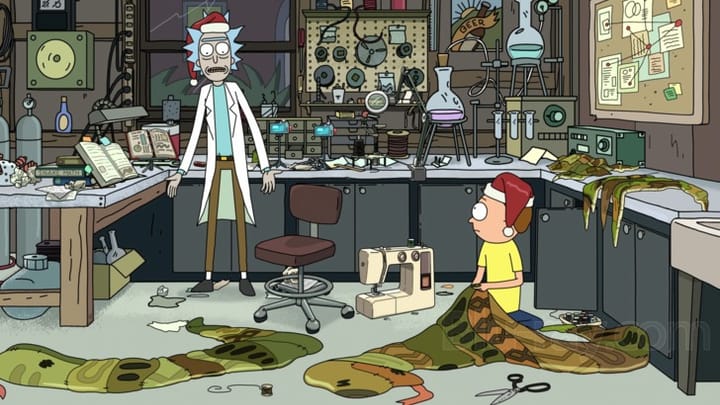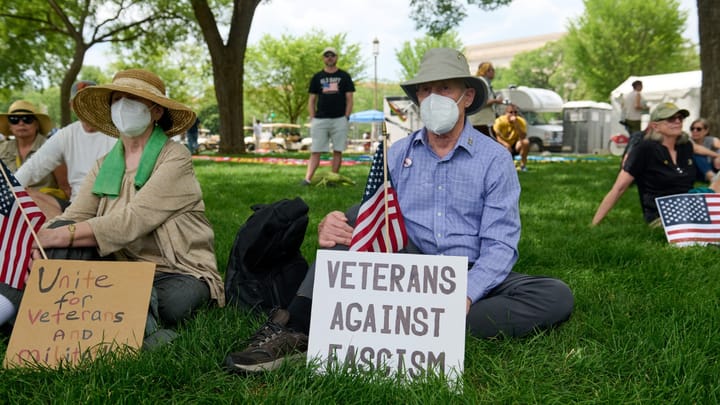The EPA, Pollution Standards, Industry Lobbying, and Whistleblowers
My latest guest spot on Hudson River Radio

I had more fun than a barrel of monkeys with Maxine and Malcolm on The Many Shades of Green show talking about the EPA, pollution, industry lobbying, and the importance of whistleblowers to society (and the great work of whistlebloweraid.org.
If you enjoy -please feel free to share!

https://www.spreaker.com/user/10880920/tmsog-11-16-2023-george-polisner-whistle
My Notes from the Episode are below:
1. The cost of 'cleaner' anything
⦁ The Biden/Harris Administration is preparing to strengthen air quality standards. A major input is public health vs. cost of compliance.
⦁ The Environmental Protection Agency (part of the big liberal radical socialist nanny government -oh wait, it was created by Richard Nixon!) will soon announce new regs governing air pollution. And when more stringent regs are close -factories, power plants, and others all start complaining about dire consequences. (cost to comply with regs) -this is normal -every 5 years the EPA looks at science behind the relationship between pollution and impact on citizens breathing in particulate matter.
⦁ EPA under Trump led by climate skeptic and lobbyist Scott Pruitt said everything is fine! (note that Pruitt -appointed by I'm going to drain the swamp and only hire the best people, resigned while under 14 different federal investigations.
⦁ Coalition of major industries from mining, big oil, coal sent a letter saying if they have to be concerned with the lungs of poor people, there will be horrible economic consequences.
⦁ Newer manufacturing facilities don't have an issue with more stringent control. It's the older power generation, smelters, and manufacturing that would be forced to retrofit and adapt.
⦁ In cost benefit models, reducing the pollution limit from 12 micrograms to 9 would save $55 billion over the next 10 years -compared to a projected cost to implement of $500 million.
⦁ like all things, enter politics. 17 dem AG's wrote a letter of support for stricter standards, 17 GOP AG's said go ahead and kill and sicken people so you know, profit.
⦁ Profit for a company is derived by generating revenue and minimizing costs. Costs are things like energy/utility costs, supplies, executive pay, worker salaries and benefits, consulting fees, and political lobbying. Let's say I have a choice between buying and installing a carbon sequestration device for $5 million dollars, or buying a state attorney general and governor for $500,000 in political donations in, well, let's say Texas. I save $4.5 million, the governor and the AG receive $500,000. In the meantime -5,000 more people who are poor and live by my plant end up with asthma, other respiratory disease or even cancer? F them. That's an example of externalizing costs to taxpayers who then pay for healthcare for the poor. Oh, and the state AG will sue the feds to stop the clean air standards.
⦁ At the local level, while politics plays a huge role, it depends.
⦁ In Ohio, the city of Columbus -professional services, banking, and insurance are the dominant industries. Regional planning commission said, more stringent standards are fine. “There may be some economic costs to major polluting industries, but there’s real health and environmental costs if we do nothing,” said Brandi Whetstone, a sustainability officer at the commission. In Columbus, clean air, blue skies, and community health are competitive advantage.
⦁ In Cleveland, steel, chemical, and machinery production is dominant. They seek proactive financial assistance for retrofitting and compliance.
⦁ The Ohio Air Quality Development Authority has used a combination of grants and low-cost bond financing to help fund upgrades and retrofits.
⦁ Now, Biden/Harris admin's Inflation Reduction Act set up $27 billion for the EPA to finance clean energy projects.
⦁ California has spent more than $10 billion to help factories and farmers pollute less. In the central valley of California the combination of extraction and agriculture is exceeding current limits by 33%. Based on the proposed level the region would be almost 80% over the maximum.
⦁ Dr. Catherine Garoupa, Exec Dir. of the Central Valley Air Quality Coalition “One of the huge imbalances in our region is that the trend has been to cater to industry, treat them with kid gloves, give them billions of dollars in incentive money for them to continue their practices. They’re generating wealth, but not for the people that actually live in the valley and are breathing the air.”
⦁ The chair of the San Joaquin Valley Air Pollution Control District, which includes 4 of the 6 most polluted counties filed a letter of warning that the consequences will be devastating if the standard is toughened.
⦁ One point of agreement between proponents and many foes of a stronger standard: If the E.P.A. moves forward with tougher rules, it should also crack down on pollution sources, including railroads, ships and airplanes, under its sole jurisdiction. (The agency has proposed a stronger standard for heavy-duty trucks, around which a similar fight is playing out.)
⦁ Rebecca Maurer is a City Council member representing a Cleveland neighborhood that has some of the area’s worst pollution. Her office frequently hears from constituents seeking help with housing that is safer for children with asthma, which occurs at alarming rates. The district encompasses an industrial cluster that includes two steel plants, an asphalt plant, a recycling depot, rail yards and assorted small factories.
⦁ That’s the most visible source of emissions, but Ms. Maurer thinks her district’s many highways — and the diesel-powered trucks driving on them — offer the greatest opportunity for cleaning up the air, which requires state and federal action. And light manufacturing jobs are needed to employ the two-thirds of the county’s residents who lack college degrees, she said.
⦁ “What we don’t want is another asphalt plant, and we don’t want e-commerce,” Ms. Maurer said. “We want something in between. We’re trying to thread this needle between these hugely polluting plants and low density, low-wage warehouse jobs.”
2. Whistleblowers (whistlebloweraid.org): heroes.
⦁ whistleblowers (kind of a silly name based upon their profound importance to democracy, justice, and the public interest.
⦁ courage to speak out against power/authority in cases of corruption, ethics, environmental damage, safety hazards, putting public at risk, criminal acts, exploitation, and abuse -they hold power to account. They deter wrongdoing and promote accountability.
⦁ Whistleblowers face significant risks.
When they come forward. These risks can include retaliation from their employers, loss of their jobs, and even physical harm. As a result, many whistleblowers remain silent, allowing wrongdoing to continue.
⦁ To protect whistleblowers and encourage them to come forward, many countries have whistleblower protection laws in place. These laws prohibit employers from retaliating against whistleblowers and provide them with legal remedies if they are discriminated against.
⦁ Examples of famous whistleblowers:
daniel ellsberg/Pentagon Papers
mark felt: watergate's 'deep throat'.
edward snowden and surveillance/invasion of privacy
karen silkwood/nuclear plant safety issues
John Schilling/medicare fraud
⦁ Rick Scott's involvement in Medicare fraud was first exposed in 1997 by a whistleblower named John Schilling. Schilling was a former Columbia/HCA employee who worked in the company's billing department. He noticed that the company was routinely billing Medicare for services that were not provided or were not necessary.
Schilling reported his concerns to his supervisors, but they did not take any action. He then took his concerns to the federal government, and in 1999, Columbia/HCA was charged with Medicare fraud. The company eventually pleaded guilty to 14 felonies and agreed to pay a $1.7 billion settlement, the largest at the time for a healthcare fraud case.
Scott was CEO of Columbia/HCA at the time of the fraud, and he was aware of the company's billing practices. However, he has denied any wrongdoing, claiming that he was unaware of the extent of the fraud.
Schilling's actions helped to expose a massive Medicare fraud scheme and hold a powerful company accountable. He has been praised for his courage and for his willingness to stand up for what is right.
⦁ The Anonymous Intelligence Officer:
A member of the intelligence community reported on Trump's attempt to extort Ukraine and delay the delivery of critical weapons for the protection of Ukraine.
⦁ Whistleblower Aid attorneys Andrew Bakaj and Mark S. Zaid jumped in to represent them. The lawful, protected complaint they filed triggered multiple investigations into the President’s use of his office to engage in election interference and ultimately resulted in the first impeachment of then President Donald Trump. The reason we know about Trump’s illegal misconduct is only because a civil servant had the courage to speak out.
⦁ congratulations to Whistlebloweraid.org: ceo libby liu, and vp naomi seligman
⦁ Whistleblower Aid is honored to receive the Clarence B. Jones Impact Award and to join a growing legacy of mission-driven organizations driving social change and justice in our country. This award recognizes the courage, sacrifice, and impact of public interest whistleblowers who are vital in protecting our democracy and rule of law.
⦁ past winners: innocence project, united we dream




Comments ()